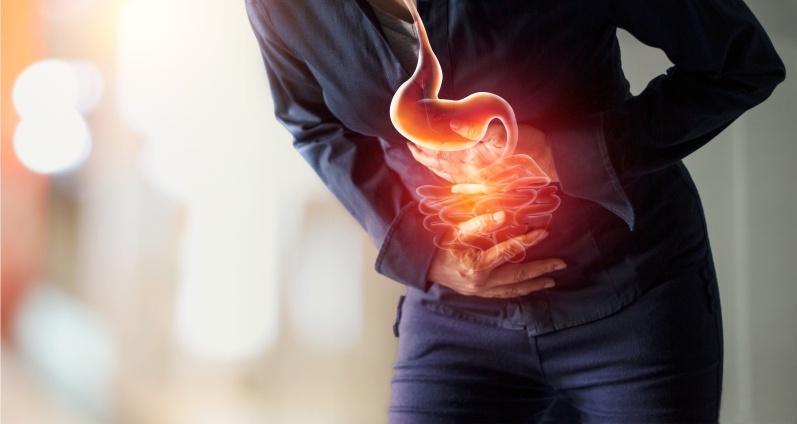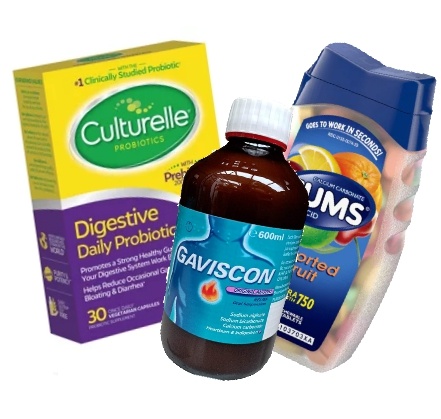
By Stephanie Simons,
Head Pharmacist,
Lindo’s Pharmacy in Devonshire
Let’s face it – we give our tummies a hard time. When we’re not complaining about them, we’re squeezing them into skinny jeans, filling them with fast food, or trying to crunch them into nonexistence. But why is this? On the one hand, our stomachs contain powerful tools that give us energy, build our strength and, ultimately, keep us alive. Yet for some they also cause a variety of problems.
The region of the body between the ribs and the pelvis contains the digestive system, a series of organs, including the stomach, intestines, pancreas, liver and gallbladder, loosely connected by tissue that enables them to expand, shrink and move against each other. The kidneys and spleen are also located in the abdominal area.
Your digestive system processes the food we eat and breaks it down into smaller parts that our bodies can absorb: carbohydrates into sugars, proteins into amino acids, and fats into fatty acids and glycerol. This provides us with energy and enables growth and cell repair – all vital for our bodies to function. So where do the problems start? And how can we tackle them?
IBS
Irritable Bowel Syndrome (IBS) is the most common gastrointestinal disorder, affecting up to 15% of people in the US. Disruption in the small and large intestines causes abdominal pain often surrounding bowel movements, leading to diarrhoea, constipation, bloating and/or flatulence.
There is no direct cure for IBS, but many people manage their symptoms by adapting their diet and lifestyle. Known to slow down or speed up digestion, anxiety and stress are key triggers of IBS. It’s therefore important to find ways to relax, particularly around mealtimes. Exercise and meditation are known to reduce stress levels, or you could try an herbal remedy like peppermint, ginger or fennel teas an hour or so before you eat.
Studies also show that probiotics may improve digestion and thus ease IBS symptoms. Many yogurts have added probiotics or you could try a supplement like Culturelle or PB8 to help get things moving. Alternatively, some find IBS remedies like Colpermin or digestive enzymes can be useful or you can speak to your GP or pharmacist.
Around one in ten people experience bloating, whether or not they have other IBS symptoms. We all know an overly large meal can make us bloat – one high in fat can have the same effect, as fats take longer to digest and keep the stomach full for longer. Eating too fast also cause your abdomen to swell. Limit your fats and take your time when eating to help reduce your symptoms. You could also try Beano, Gas-X or digestive enzymes to smooth things along.
Bloating can also be caused by gas in the digestive system – half of which is simply swallowed air building up in the intestines. Again, eating slowly can help as it reduces the amount of air you ingest. Avoid drinking from a straw and aim for still rather than fizzy drinks to further lower the levels of gas blocking things up.
Acid reflux
We all know that feeling – you’ve just finished a great meal, but your chest is starting to burn. This is due to acid reflux, when the acid formed in the stomach through digestion begins to travel upwards towards the chest. This can also leave a sour taste in your mouth.
Many things can cause acid reflux, from certain foods and drinks like coffee, tomatoes, alcohol, and fatty or spicy foods, to smoking, stress and/or pregnancy. Antacids like Tums or Gaviscon are the quickest way to relieve your symptoms – aim to take them with your meal or soon after. Stronger acid reducers like Omeprazole or Famotidine can also be helpful. Longer term, quitting smoking, easing your stress and/or avoiding foods that trigger your symptoms are the best ways to avoid the dreaded heat.
No one’s stomach always feels comfortable – there are too many complex processes at work. The simplest ways to ease your digestion are to eat healthy meals, exercise as much as you can, and speak to your pharmacist if you need some extra assistance.
If you’re experiencing significant pain and discomfort, always speak to your GP.
Stephanie Simons is the head pharmacist at Lindo’s Pharmacy in Devonshire. She earned her Bachelor of Science in Pharmacy at Massachusetts College of Pharmacy and has been practicing for over 20 years. She is a registered pharmacist with the Bermuda Pharmacy Council and is a member of the Bermuda Pharmaceutical Association.




